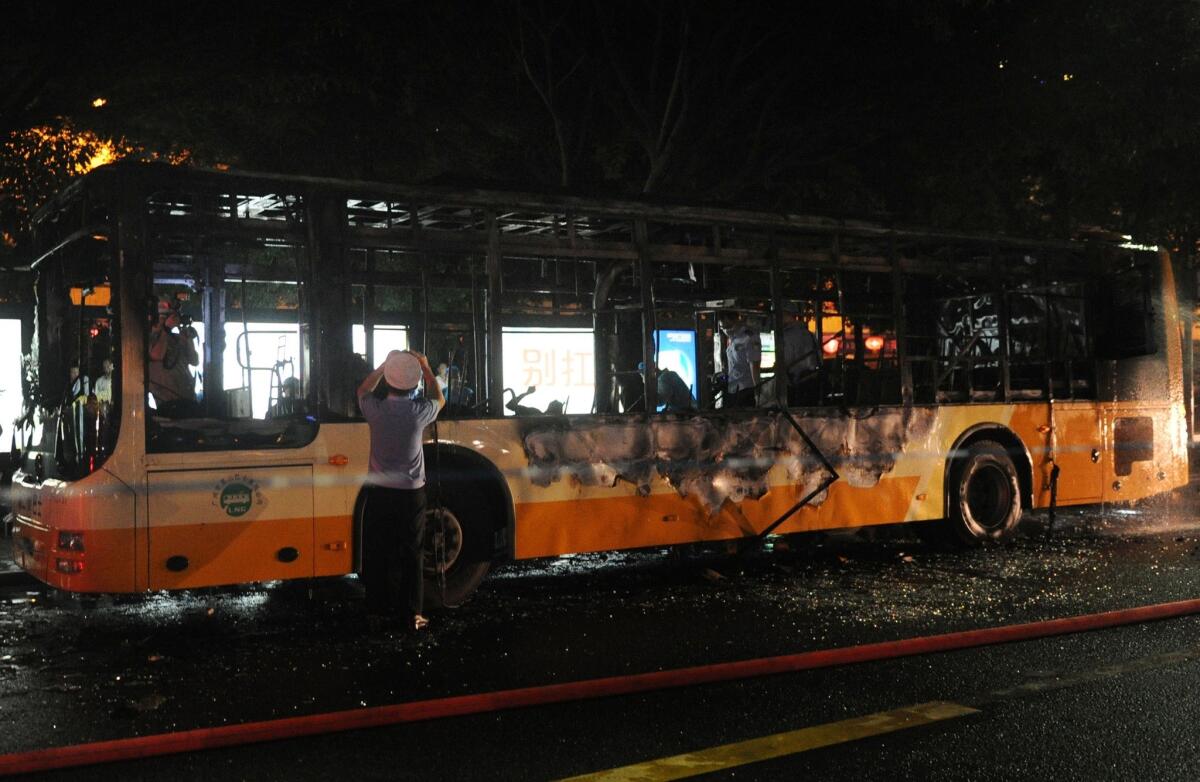With China already on edge, bus arsons add to public’s unease

- Share via
Reporting from Beijing — Chinese authorities have been on heightened security alert lately in the wake of deadly knifings and bombings at train stations blamed on separatists and terrorists. But the nation’s bus riders have now come under repeated arson assaults from a different breed of attacker.
In a span of 10 days, three buses have been set ablaze in busy metropolitan areas, leaving two people dead and 72 injured. The suspects seemed to carry no political or ethnic grudges. Instead, they all are said to be isolated young men struggling with such mundane problems as money woes and lack of hope for a prosperous future.
The rash of attacks started July 5, when authorities say 34-year-old Bao Laixu ignited some flammable liquid in his backpack as soon as he boarded a bus in rush-hour traffic in Hangzhou, a city not far from Shanghai. A week later, a 30-year-old man did the same thing aboard a bus in the center of Changsha, in Hunan province. On Tuesday evening, authorities say, Ou Changsheng, 25, set a bus on fire at a busy intersection in downtown Guangzhou, in southern China.
Videos of the incidents, circulated on social media and other channels, have caused unease among the public.
“From a psychological point of view, people have a tendency to copy others, especially when they want to express their angers,” said Yang Shu, a counterterrorism expert at Lanzhou University. “With the speed information is floating today, it’s very easy for people with grievances to imitate the act when they read news about an attack on a bus with fire.”
In the latest incident, the suspect wanted to vent his anger after losing money gambling, police in Guangzhou said. A witness described seeing a young man in a blue striped shirt setting a plastic bag alight before exiting via from the back door. The fire caused an explosion, killing two passengers and injuring 38.
Local media said Ou, the suspect in the latest case, grew up in a small village in Hunan. Following many fellow villagers’ footsteps, he left home to look for a brighter future in big cities. He moved to Guangzhou about three years ago to work as a carpenter, Guangzhou-based Southern Weekend reported. He was arrested a day after the fire at an Internet café; family and friends told reporters he was a shy and quiet man who never had a girlfriend.
In the attack in Changsha, the suspect, who was identified only by his surname, Chen, had a similar profile. Chen told local police that he arrived in the city a day before the attack, hoping to find a job. After failing to find a position immediately, and running short of money, he decided to “cause an incident that can land him in prison to enjoy free food there,” police said.
Bao, the suspect in the first attack in Hangzhou, had his own tale of woe, local media reported. He was fighting tuberculosis for five or six years while shifting between jobs at paper manufacturing factories. His mother, still living in their family home in an impoverished village in Gansu province, said Bao hadn’t called her since leaving home six years ago.
Despite similarities among the three suspects, identifying and preventing such attacks is a tall order, Yang said.
“None of them committed any crime prior to launching these attacks,” he said. “This makes it very hard to identify who is likely to carry out the next attack as there are so many people with similar grievances in China today.”
In recent years in China, public transportation has become a target of both Han Chinese with pedestrian grievances and Uighur separatists angry with the government.
In 2009, a bus was set on fire in downtown Chengdu, killing 28 people and injuring 74. In June 2013, a disgruntled 59-year-old started a fire on a bus, causing its gas tank to explode. The blast killed 47 people, including the suspect, and injuring 34. Earlier this year, two bus fires caused by arsonists left seven people dead and 112 injured.
This year, attacks at train stations by Uighur separatists in March and April left 36 dead, including the assailants, and over 220 injured. Detailed coverage on the attacks in the media has heightened anxiety over terrorism among the public. Authorities have deployed more security personnel nationwide and some police have been armed with guns for the first time in years.
But with the increased security measures failing to prevent the recent arson attacks, the public is calling for additional steps to ensure the safety bus passengers. Many cities are starting to add a security officer on every bus. But Yang, the security expert, was skeptical such efforts would work.
“The cost is simply too high to have such a person on every bus in the country,” he said. “It’s better to improve our social structure to make less people face such situations in their lives.”
Tommy Yang and Julie Makinen in the Times’ Beijing bureau contributed to this report.
Follow @JulieMakLAT for news from China.
More to Read
Sign up for Essential California
The most important California stories and recommendations in your inbox every morning.
You may occasionally receive promotional content from the Los Angeles Times.













